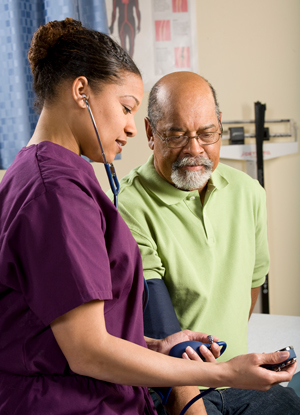Diabetes: Exams and Tests
For your diabetes care, you may see your primary care provider or a specialist 2 to 4 times a year. Below is a guide to the regular exams and tests advised for people with diabetes. It may seem like a lot to do, but caring for yourself will pay off. It will help both your physical well-being and your quality of life over the coming years. To learn more, contact the American Diabetes Association at www.diabetes.org or 800-342-2383.
Tests and vaccines

These should be done at least as often as stated below:
-
Blood pressure check. Every healthcare provider visit. Or check at home more often if advised.
-
A1C. At first, every 3 months. If controlled, then every 3 to 6 months.
-
Cholesterol and blood lipid tests. At least every 12 months.
-
Urine and blood tests for kidney function. At least every 12 months or more often.
-
Flu shots. Once a year.
-
Pneumonia shot. Ask your provider which pneumonia vaccines are right for you.
-
Hepatitis B shots. As soon as possible if you’re younger than 60. Or as advised by your healthcare provider after age 60.
-
Shingles vaccine. At age 50 or older, or age 19 or older if you have a weak immune system. Get the shots even if you have had shingles or a past shingles or chickenpox vaccine.
-
Tdap vaccine. Every 10 years. This vaccine includes protection against tetanus, diphtheria, and whooping cough. Pregnant people should get an additional dose.
-
Covid-19 vaccine. Initial vaccine and updated boosters.
-
RSV vaccine. One dose at age 60 or older. This vaccine protects against RSV (respiratory syncytial virus).
-
Personal nutrition therapy. At least once, then as often as needed.
-
Stop smoking counseling. If you still smoke, at each visit.
-
Early heart failure screening. A blood test at least every year.
-
Bone mineral density scan. A baseline scan is usually advised for women when they start menopause and for men at around age 50.
-
Peripheral artery disease (PAD) screening. Advised for people with PAD symptoms, people without PAD symptoms at age 50 and above, any microvascular disease, or diabetes-related end-organ damage or foot complications. PAD screening is also considered for people who have had diabetes for 10 or more years.
-
Other tests or vaccines. As advised by your provider.
Regular exams
These exams may help prevent problems from developing and keep you healthy.
Foot exams
Nerve and blood vessel problems can affect your feet first. Have your provider check your feet at each visit. Take off your shoes and socks when you enter the exam room. This will help you remember to have your feet checked. Also check your feet at home every day. Look for pressure sores or injuries. Use a mirror to see all the parts of your foot. Contact your provider right away if you see problems.
Eye exams
You can have problems with your eyes even if you don’t have trouble seeing. An eye care provider (ophthalmologist) or specially trained optometrist will give you a dilated eye exam at least once a year. Tell your provider right away if you:
-
See dark spots, flashing lights, or floaters
-
Don't see well in dim light
-
Have eye pain or pressure
-
Have any other vision problems
Dental exams
Gum disease is also called periodontal disease. Gum disease and other mouth problems are common in people with diabetes. To help prevent these problems, see your dentist 2 or more times a year. Tell your dentist that you have diabetes. Tell them about all the medicines, vitamins, and supplements you are taking.
Ask your healthcare provider what other exams you’ll need on a regular basis.
Online Medical Reviewer:
Chris Southard RN
Online Medical Reviewer:
Rajadurai Samnishanth Researcher
Online Medical Reviewer:
Rita Sather RN
Date Last Reviewed:
3/1/2024
© 2000-2024 The StayWell Company, LLC. All rights reserved. This information is not intended as a substitute for professional medical care. Always follow your healthcare professional's instructions.